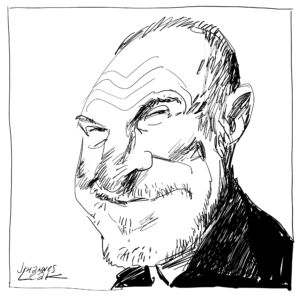Was that Coldplay kiss-cam moment the kiss of death for privacy?
In the digital age, our intimate moments are no longer fleeting or our own.

Want unlimited, ad-free access? Become a spiked supporter.
Andy Byron, former chief executive of software firm Astronomer, was caught with his arms around the company’s chief people officer, Kristin Cabot, at Coldplay’s Boston Gillette Stadium gig last week. He has since resigned his position, though he is no doubt cradled in the loving embrace of a severance package that would dwarf what most of us earn from a hard decade’s graft.
That was a week ago, but the aftershocks continue to resound. Just days ago, Liam Gallagher assured Oasis fans that if there were any ‘lovebirds’ in the crowd, they need not worry: ‘We ain’t got any of that Coldplay snidey fucking camera shit.’
On the face of it, the kiss-cam incident was nothing new. There are very familiar examples that continue to swirl around the seemingly unflushable slop accounts that now dominate X and TikTok, featuring couples caught getting intimate and then suddenly registering shock and confusion when they realise their illicit liaison has been broadcast ‘in 4K’, as the current saying goes, to an entire stadium.
One aspect of this is well understood – that looking alarmed, ‘caught out’, panicked, while an entirely understandable animal reaction, is the one thing guaranteed to take the shot from the inconsequential and immediately forgettable to the viral. The chances that anyone in the stadium, let alone one of the parties betrayed, is going to recognise that you are in the throes of an adulterous prologue are slim. What makes the clip explode on social media and make its way into the Daily Mail is precisely the guilty start, the draining cheeks, the headlight eyes. Much better, as many other clips have done, to begin to jokingly mime fellatio, to ‘lean in’, rather than trying to remove one’s hand from the cookie jar as if it had just been resting there. Failing that, ensure that you have both had a double dose of botox before the potential exposure, so that only your eyes can register the alarm.
I am reminded of an urban – or, I suppose on reflection, rural or even maritime – legend concerning three junior officers caught sunbathing naked after a swim. They all jumped up and two of them immediately covered their genitals with their caps. The third, with an admirable presence of mind, covered his face. Calculating, surely correctly, that he was much less likely to be identified in that configuration.
This strategy might be worth briefing your date on in preparation for a ‘Jumbotron’ scenario. But then, unlike those young officers who were lucky enough to have lived in the pre-digital era, it is already likely too late to keep your privacy intact.
Oddly though, one aspect of the recent farrago was indeed very reminiscent of that quaint, unrecorded epoch. The ‘magnifying glass’ screen the couple appeared on reminded me of the marvellous brass’n’glass contraptions of Jules Verne’s and HG Wells’s imagination, such as those in The Time Machine. Or perhaps, better yet, the glorious camera obscura, pride and joy of the avuncular Dr Frank Reeves in the incomparable A Matter of Life and Death. This he used not to expose naughtiness in the village – but simply to enjoy, in a somewhat God-like manner, casting a benevolent gaze across his flock.
A longing for a means to watch over all of humanity has a long and occasionally even noble history. Jeremy Bentham devised the notorious ‘panopticon’ to give prison warders a permanent view of their charges – or at least the threat of such a thing, which it was hoped would guarantee their good behaviour. As HL Mencken observed, a conscience is a little voice that whispers ‘someone may be looking’. Bizarre and inexplicable as this may be in evolutionary terms, this does seem to be at least part of the genealogy of our moral code. In one of his famous thought experiments, Plato asked us to imagine how well-behaved we would be if we had a ring that rendered us invisible? His summation was that very few of our red lines would long stay uncrossed.
The danger is not that individual discoveries will wreck lives – very possibly the couple at the Coldplay gig will be in a happier place a year from now, confronting and accepting the truth of their true feelings, and indeed the banality of their music tastes. No, it is that such God-like powers are not meant for mortal man. As we see in everything from the Palantír of Tolkien’s Lord of the Rings to the Church roof tops in Chesterton’s The Hammer of God, such omniscience eats away at the soul. It feeds paranoid suspicions, even if – as in Rear Window – these turn out to be correct.
Perhaps the possibility that one might be watched at all times might make us more moral, more upright. But we should be very concerned for the general drift of a world in which technology is finally making possible one of man’s longest-desired, and most sternly warned-against, Faustian pacts.
Simon Evans is a spiked columnist and stand-up comedian. Tickets for his tour, Have We Met?, are on sale here.
£1 a month for 3 months
You’ve hit your monthly free article limit.
Support spiked and get unlimited access.
Support spiked – £1 a month for 3 months
spiked is funded by readers like you. Only 0.1% of regular readers currently support us. If just 1% did, we could grow our team and step up the fight for free speech and democracy.
Become a spiked supporter and enjoy unlimited, ad-free access, bonus content and exclusive events – while helping to keep independent journalism alive.
———————————————————————————————————————————–
Exclusive January offer: join today for £1 a month for 3 months. Then £5 a month, cancel anytime.
———————————————————————————————————————————–
Monthly support makes the biggest difference. Thank you.











Comments
Want to join the conversation?
Only spiked supporters and patrons, who donate regularly to us, can comment on our articles.